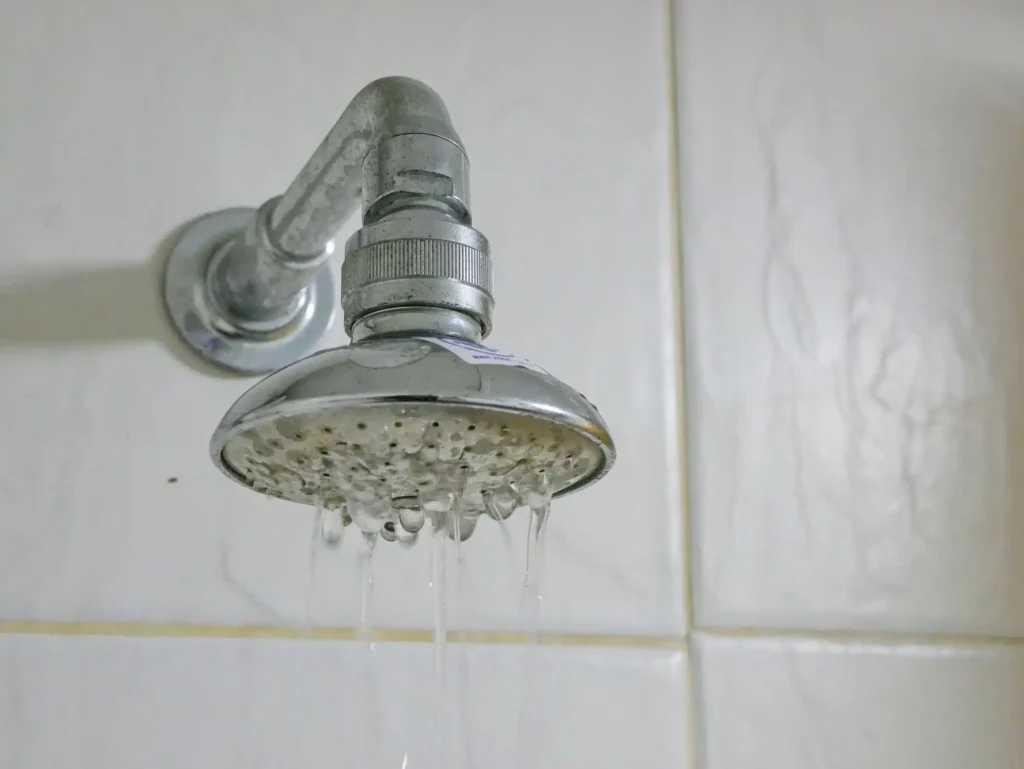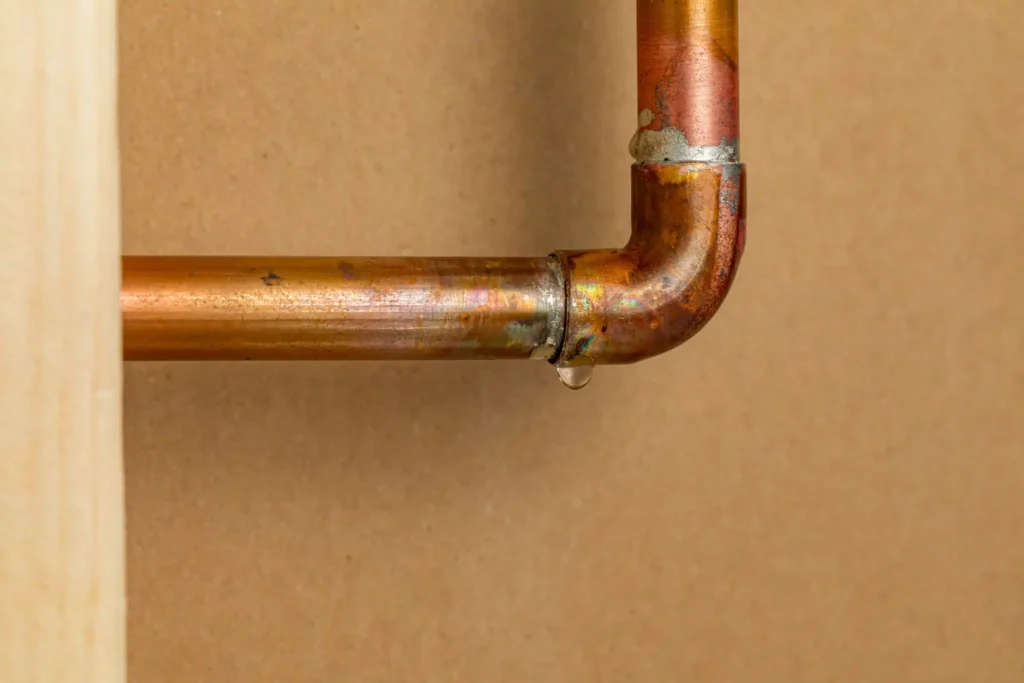Low water pressure can happen because of partially closed main valves, clogged water lines, or bad pressure regulators. Fixing these issues can usually bring the pressure back to normal. For tough problems, think about hiring a plumber.
Signs of Low Water Pressure

Photo from iStock – Credit: Ole_CNX
Ever found your morning shower lacking that blast?
Low water pressure can be a real bummer.
But how do you know if this problem is in your home in Dallas, TX?
Look out for signs like slow-filling toilets, weak shower streams, and low flow at faucets.
Simple enough, right?
To be sure, you might want tools like a pressure gauge.
The Bourdon gauge can help; it shows pressure, giving you a clear picture.
Here’s a tip: pressure is measured in units of force per unit of surface area.
Knowing your numbers can save you a lot of trouble!
Pressure sensors are key in many fields, from factories to planes.
These sensors can also help if your home pressure is off.
Start by measuring.
Attach a gauge to a faucet and check the needle.
Normal home pressure in Dallas, TX is between 40 and 60 psi.
Anything much lower, and you’ve got a problem to fix.
Don’t ignore these signs!
Fixing low water pressure early helps avoid bigger issues later.
And if DIY isn’t enough, call the experts at Benjamin Franklin Plumbing of Dallas, TX.
Using Multiple Water-Using Appliances at Once
Ever notice a sudden drop in low water pressure when you run the dishwasher, do laundry, and take a shower all at the same time?
Using many water-using appliances at once can really hurt your home’s water pressure.
When several fixtures pull water from the same source, they strain your plumbing.
This often leads to less pressure at each outlet.
To fix this, try spreading out your water use.
For example, start the dishwasher after your shower or run the washing machine in the evening.
Staggering these tasks can help keep water pressure steady throughout your home.
An easy fix, right?
Sure, you might need to change your routine a bit, but the results are worth it—no more weak showers or half-clean dishes!
Remember, balancing your appliance use isn’t just about convenience; it’s key for keeping low water pressure steady and preventing extra wear on your plumbing.
If you’re in Dallas, TX, and still have problems despite these changes, it might be time to look for other issues or talk to a plumber.
A professional plumber like Benjamin Franklin Plumbing of Dallas, TX, for expert advice and solutions.
Partially Closed Main Valve
Ever wondered why your low water pressure is an issue in your Dallas, TX home?
One common cause might be a partially closed main valve.
Fixing this is easier than you think.
First, find your main water valve.
It’s usually near the water meter.
It could be in your basement, garage, or outside.
Once you find it, check if the valve is fully open.
A fully open valve is turned all the way counterclockwise.
If you’re unsure of the valve’s position, look at the handle.
For a round handle, turn it counterclockwise as far as it goes.
For a lever handle, make sure it’s parallel to the pipe.
Sometimes, a valve might be partially closed by mistake, causing low water pressure.
To open it fully, use a wrench or pliers if needed.
Be careful not to force it too much to avoid damage.
Check the main valve regularly to make sure it’s fully open.
Keeping this valve in good condition can prevent low water pressure problems and keep your plumbing in top shape.
If you need help, you can always contact Benjamin Franklin Plumbing of Dallas, TX for expert advice.
Water Meter Valve Issues
Is your Low Water Pressure causing problems?
It might be your water meter valve.
Checking this valve is key to keeping a steady water flow.
First, find your water meter, usually in a box near the street.
Look at the valve next to it.
A partly open valve can lower your water pressure and make showers weak.
To see if the valve is the issue, check its position.
The valve handle should be in line with the pipe, showing it’s fully open.
Turn the valve counterclockwise to open it more if needed.
A fully open valve keeps the pressure good in your home.
Another issue can be the water meter valve being affected by city work or internal problems.
If you’ve noticed Low Water Pressure after municipal work, this could be your issue.
Check with your local water utility to rule out external causes.
Remember, these steps might show bigger issues.
If the problem doesn’t go away, call Benjamin Franklin Plumbing of Dallas, TX to fix complex plumbing problems.
Failing Pressure Regulator
Is your shower more of a drizzle than a downpour?
It might be time to check your pressure regulator.
This key part controls the water pressure entering your home to keep a steady flow and protect your plumbing.
But a failing pressure regulator can often cause Low Water Pressure.
Signs of a Failing Regulator:
It’s important to spot the signs early to prevent damage.
Watch for water pressure that fluctuates while using faucets.
If the pressure goes up and down, your regulator might be the problem.
You might also hear strange sounds like banging or knocking from the pipes.
These noises are not just annoying—they’re a warning.
Another sign is a sudden drop in low water pressure.
Like any part, pressure regulators can wear out over time and cause sudden changes.
If you notice these signs, act quickly.
Replacing a pressure regulator is not usually a DIY task.
It needs special tools and skills to avoid big water damage.
For folks in Dallas, TX, contacting a professional like Benjamin Franklin Plumbing of Dallas ensures the job is done right and keeps your plumbing system safe.
Faulty Plumbing Fixtures
Ever wonder why your faucet suddenly turns into a trickle?
It could be because of faulty plumbing fixtures in your Dallas, TX home.
Over time, faucets, showerheads, and other fixtures can get clogged with mineral deposits or just wear out.
If you notice low water pressure at one fixture, it’s likely time for some DIY maintenance.
Common problems with fixtures include the buildup of mineral deposits from hard water.
To fix this, soak the aerator or showerhead in vinegar overnight to dissolve the calcium.
Sometimes, removing the aerator and cleaning the screen can bring back proper flow.
Another issue might be a broken fixture.
For instance, old faucets may have parts inside that are worn out.
Replacing these parts or even the whole fixture can be an easy fix.
Newer fixtures often come with flow restrictors or advanced pressure-balancing features for steady water pressure.
If DIY fixes don’t work or you’re unsure about the repair, it’s smart to call professionals like Benjamin Franklin Plumbing of Dallas, TX.
They can diagnose and fix even the trickiest plumbing problems, bringing back your low water pressure and peace of mind.
Problems with Water Supply
Ever wonder why your faucets are barely trickling?
Low water pressure could be due to problems with your water supply.
Things like city water issues, maintenance work, or even seasonal changes can cause low water pressure in Dallas, TX.
Are your neighbors also having low pressure?
If so, it might be a community issue.
Contact your local water supplier to check.
Water companies often do maintenance or repairs that can temporarily drop water pressure.
If your house is at the end of a water line or on a hill, you might have more pressure issues.
These situations need a good understanding of your home’s location to the main water line.
Weather can also sneak in as a factor.
Extreme temperatures can make pipes expand or contract, cutting water flow.
Using pressure measurement tools like a gauge can give accurate readings.
When supply issues persist and lead to low water pressure, it’s time to call the pros.
Benjamin Franklin Plumbing of Dallas, TX has skilled plumbers who can diagnose and fix water pressure problems that start outside your home’s plumbing system.
Their expertise ensures you get a steady water supply, so you won’t have to deal with low water pressure.
Photo from iStock – Credit: JJ Gouin
Leaking Water Pipes
Is your water bill high and your low water pressure a concern?
You might have leaking pipes.
Finding leaks early can stop big damage and costly repairs.
Look for signs of leaks around your home.
Check for damp spots on walls or ceilings, mold or mildew, and puddles that don’t make sense.
Listen for running water sounds when all faucets are off.
If you think you have a slab leak, which is a leak under your home’s foundation, check for warm spots on your floor or higher water bills without more water use.
Fixing leaks depends on where and how bad they are.
For small leaks you can see, epoxy putty or pipe repair clamps can be quick fixes.
For leaks in hard-to-reach places, like behind walls or under the foundation, it’s best to call a pro.
Experts like Benjamin Franklin Plumbing of Dallas, TX can handle tricky leaks using special tools and methods.
Ignoring a leak can lead to big problems and headaches later.
Fixing it right away keeps your plumbing working well and your home safe from water damage and prevents low water pressure issues.
Impact of Shared Water Lines
Ever notice your shower loses low water pressure when someone runs the dishwasher or flushes the toilet?
Shared water lines could be the blame.
When multiple fixtures are used at once, the water pressure can drop, especially in older homes with old plumbing systems.
This happens because the water in the pipes is split between all active fixtures, lowering the pressure for each one.
To reduce pressure loss caused by shared lines, plan appliances use wisely.
For example, don’t run the washing machine or dishwasher while taking a shower.
Installing a pressure balancing valve in your plumbing system can help manage and spread water flow evenly, making sure high-demand fixtures like showers and sinks get enough pressure.
Sometimes, upgrading your plumbing to have separate supply lines for major fixtures might be needed.
Hiring a professional service like Benjamin Franklin Plumbing of Dallas, TX can provide a full evaluation and suggest the best action plan.
They can identify if shared water lines or something else is the root cause, giving you the most effective solution for your needs related to low water pressure.
Undersized Branch Lines
Ever noticed a trickle instead of a stream when you turn on your tap?
Small branch lines could be the reason for your Low Water Pressure.
These lines spread water from the main line to different fixtures in your home.
Think of your plumbing system like veins and arteries in your body.
If the arteries are too narrow, blood flow slows.
If your branch lines are too small, water pressure drops a lot.
Signs of small branch lines include weak water flow from many fixtures and a big drop in pressure when using multiple water-based appliances.
For example, running the dishwasher while taking a shower could leave you with a frustrating trickle instead of a refreshing gush.
When should you consider resizing branch lines?
If you keep having Low Water Pressure issues, it might be time to get help from an expert.
Plumbing pros, like Benjamin Franklin Plumbing of Dallas, TX, can check and resize branch lines to make sure you get good water flow throughout your home.
Ignoring the problem could cause long-term issues and damage to your pipes.
Remember, a moderate investment in repiping can greatly improve your daily water use, making your shower feel less like a chore and more like a rejuvenating escape.
How to Fix Low Water Pressure Yourself
Wondering how to tackle Low Water Pressure on your own?
Good news: DIY solutions can help.
Start with the basics: check all your faucets and showerheads.
Sediment can clog these fixtures.
Unscrew the faucet aerator or showerhead and soak it in vinegar overnight to dissolve the deposits.
Next, make sure your main water valve is fully open.
This valve is often where the main water line comes into your home.
Turn it counterclockwise until it stops.
Do the same for the water meter valve, which is right after the meter.
Some tools have pressure sensors that can help you make sure your adjustments work well.
Check for leaks.
Look for damp spots, mold, or odd water bills.
If you find a leak, patch kits from your hardware store can offer a temporary fix until you get help.
Also, check your pressure regulator near the main shutoff valve.
It might need a replacement if it’s failing.
When using multiple appliances like washers or dishwashers at the same time, water pressure can drop.
Staggering their usage can help.
For persistent Low Water Pressure, contact Benjamin Franklin Plumbing of Dallas, TX.
They can handle more complex problems and make sure your plumbing works well.
When to Call a Professional Plumber in Dallas, TX
Ever been stumped by low water pressure and unsure if it’s time to call a plumber?
While some issues can be fixed with a bit of DIY savvy, sometimes you need the pros.
Big leaks, old pipes, and complex plumbing systems often need expert help to keep your home’s plumbing safe and sound.
First off, if you’ve tried simple fixes like adjusting the pressure regulator or opening valves and still have low water pressure, it’s time to call a plumber.
Tricky issues like hidden pipe leaks or corroded mains need tools and skills most homeowners don’t have.
Expert plumbers use tools like the Bourdon gauge to measure pressure accurately.
Second, if you think your pressure regulator is failing, don’t wait.
These devices keep water pressure steady and can cause big problems if they break.
Also, if you have water supply issues beyond your house, it’s best to contact specialists who can find external problems affecting your low water pressure.
Picking the right plumber in Dallas, TX, matters.
Benjamin Franklin Plumbing of Dallas, TX is your go-to for professional plumbing services, ensuring you don’t face long disruptions in your daily routines.
Their team can handle everything from big leaks to complex plumbing fixtures, getting your home’s water pressure back in no time.
FAQs
-
How do I know if my main valve is partly closed?
Find your main valve near the water meter or where the water line enters your home. Make sure the valve handle is turned all the way open, parallel to the pipe.
-
Why does using several appliances at once lower water pressure?
When many appliances use water at the same time, they pull from the same source. This causes a pressure drop and slower flow rates.
-
What are the signs that my pressure regulator is failing?
Look for fluctuating water pressure, irregular flow rates, and odd noises from your pipes.
-
How can I tell if my plumbing fixtures are causing low water pressure?
Check fixtures for buildup or rust. If some fixtures have good pressure while others don’t, the problem might be with the bad ones.
-
When should I call a plumber in Dallas, TX?
Call a pro like Benjamin Franklin Plumbing of Dallas, TX if you have constant low water pressure, leaks, or can’t find the cause. An expert will provide lasting fixes.





